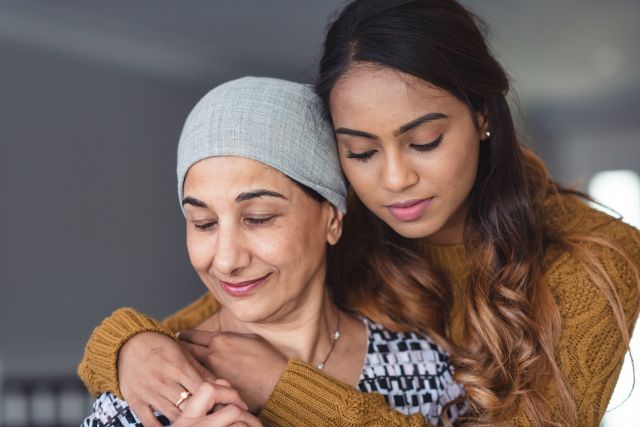Updated on March 29, 2024.
Family history can be revealing when it comes to cancers of the breast and ovaries, the two female reproductive organs that produce and store eggs. Cancer experts have known for years that having a close blood relative (such as a parent or sibling) with certain cancer types can raise your risk for the same type of cancer. But the risk may reach even further, making you more likely to develop a cancer that doesn't seem related to the one your family member might have.
The family-cancer connection
A 2018 study published in PLOS One looked at the risk of being diagnosed with ovarian cancer based on family history. The risk more than doubled if a person’s mother or sisters had ovarian cancer, compared to someone without a family history of the disease. If both mother and sister had ovarian cancer, the risk was roughly 10 times higher, and higher still if the family member was diagnosed before the age of 50.
Notably, a family history of other forms of cancer—particularly breast cancer and colorectal cancer (a digestive cancer that affects the large intestine and the rectum, the last several inches of the large intestine)—can also increase your risk for ovarian cancer.
One reason for these family connections is that certain genes influence multiple types of cancer. That means if multiple family members share a genetic variation, it could increase the risk of more than one type of cancer. For ovarian cancer in particular, it’s believed that as many as 25 percent of cases may be caused by genetics.
For example, mutations in the breast cancer gene 1 (BRCA1) and breast cancer gene 2 (BRCA2)—which encode proteins that help repair genetic material—raise the risk for breast cancer and are responsible for most cases of inherited ovarian cancers. If someone has a mutation in the BRCA1 gene, their lifetime risk of having ovarian cancer may be anywhere from 35 to 70 percent. (In other words, for every 100 people who have a BRCA1 mutation, as many of 70 of them may be diagnosed with ovarian cancer.) For the BRCA2 mutation, that risk is believed to be between 10 to 30 percent by age 70. Mutations in several other genes are also linked to a higher risk of ovarian cancer.
Statistics like these point to the importance of understanding family history and sharing that information with your healthcare provider (HCP).
How to take action
If you have a family history of cancer, you may want to take a closer look at things. Need some help getting started? In addition to collecting together your family health history, here's what you can do.
Make prevention a priority
According to the Centers for Disease Control and Prevention (CDC), smoking doesn’t only pose a risk to your lungs. It can cause cancer almost anywhere in your body. So if you smoke, quit. That’s one of the most powerful things you can do to prevent cancer.
Other risk factors for ovarian cancer can be hard to pin down and may be difficult for all people to address. For example, research shows that using birth control pills lowers the risk of ovarian cancer for people at average risk of the disease and for those who have BRCA mutations. But taking the pill comes with its own set of risks, so it’s important to consult with an HCP if you choose to take it.
People who have had certain gynecologic surgeries for medical reasons may also have a reduced risk of ovarian cancer. These include tubal ligation (during which the fallopian tubes are cut or blocked to prevent pregnancy) and hysterectomy (which involves the surgical removal of the uterus.)
Childbirth and breastfeeding may also decrease the risk of ovarian cancer, but experts would not recommend having a child for the purpose of ovarian cancer prevention.
Consider getting tested
The National Comprehensive Cancer Network recommends genetic testing for anyone diagnosed with ovarian cancer, regardless of family history. This testing can determine if a genetic mutation contributed to the cancer. If a genetic mutation is detected, other family members should be informed so that they can discuss testing with their HCPs.
Likewise, you may want to consider genetic testing if your family history suggests that a close relative has a high risk of inherited ovarian cancer, or cancer that is passed down through families. A genetic counselor or other HCP with experience in assessing genetic risk can guide you.
People who test positive for genetic mutations and are at high risk for ovarian cancer may consider having their ovaries and fallopian tubes (which connect the ovaries to the uterus) surgically removed to reduce the risk of cancer. The risk of ovarian cancer, however, is not completely eliminated by having the procedure, and it comes with its own complications, including premature menopause (when the menstrual cycle completely stops) and the inability to become pregnant.
If you have questions about genetic testing for cancer and what your insurance covers, speak with your HCP.
Keep a personal health record
As you learn more about how cancer has affected your family, make notes so that your personal health record is always up to date. Your personal health record should include a complete family history of cancer. The family history should include blood relatives including your parents, grandparents, aunts, uncles, siblings, children, nieces, and nephews. Information about your family members should include the types of cancer they have or had, the age at which they were diagnosed, and the age they died.
Key points
Knowing your family history is a powerful tool in understanding your cancer risk. While it may feel uncomfortable to face, this knowledge can also help you get diagnosed earlier, when it may be easier to treat and more treatment options may be available.







